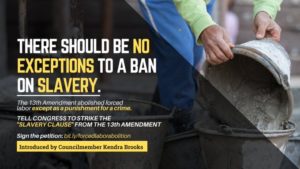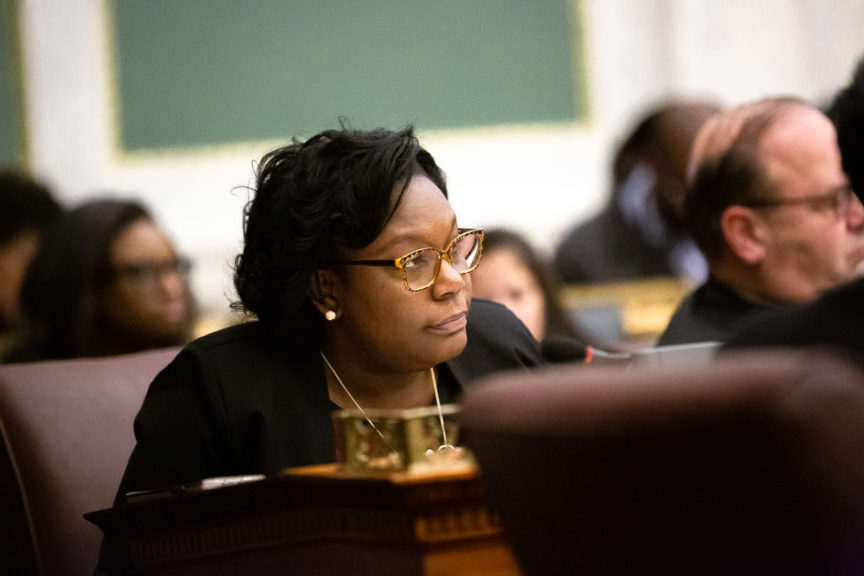Councilmembers unanimously passed a resolution in support of striking the clause of the 13th Amendment that allows slavery or involuntary servitude to continue in United States prisons.
 PHILADELPHIA—Today, a resolution introduced by Councilmember Kendra Brooks (At-Large) in support of Senate Joint Resolution 21 and House Joint Resolution 53 passed unanimously in City Council. Re-introduced by U.S. Senator Jeff Merkley and Congresswoman Nikema Williams on June 17, 2021, these pieces of legislation propose a constitutional amendment that would end forced labor in U.S. prisons.
PHILADELPHIA—Today, a resolution introduced by Councilmember Kendra Brooks (At-Large) in support of Senate Joint Resolution 21 and House Joint Resolution 53 passed unanimously in City Council. Re-introduced by U.S. Senator Jeff Merkley and Congresswoman Nikema Williams on June 17, 2021, these pieces of legislation propose a constitutional amendment that would end forced labor in U.S. prisons.
The resolution is co-sponsored by City Councilmembers Cindy Bass (8th District), Allan Domb (At-Large), Jamie Gauthier (3rd District), Katherine Gilmore Richardson (At-Large), Derek Green (At-Large), Helen Gym (At-Large), Kenyatta Johnson (2nd District), and Isaiah Thomas (At-Large).
While slavery was abolished in 1865, the “slavery clause” in the 13th amendment allows forced labor to continue as punishment for a crime. Historically, this resulted in Southern localities implementing “Black Codes”—laws which criminalized things like loitering and vagrancy—as a way to imprison and continue to profit off the unpaid labor of Black Americans. Today, forced labor continues as a common practice in U.S. prisons. Incarcerated citizens are paid little to nothing for their work in the majority of states, including five states that pay prisoners nothing for their labor. In Pennsylvania, incarcerated people make less than $1 per hour. This forced poverty exacerbates instability for many Philadelphians re-entering society, who are often excluded from the traditional workforce and face a number of structural barriers upon their release.
“As a Black woman who comes from a working-class community, where families are broken apart and lives destroyed due to over-incarceration, I know well the widespread impacts the prison industrial complex has on families in neighborhoods like mine,” said Councilmember Kendra Brooks (At-Large). “And we can’t decarcerate our country unless we eliminate the financial incentive to keep Black and brown, working class and poor people in prison. There should be no loopholes to abolishing slavery. It’s time we ended forced labor in all forms and gave our incarcerated neighbors the labor protections that all community members are owed.”
The United States is the most incarcerated country in the world, with nearly 2.3 Million Americans behind bars. Racist policies like Jim Crow laws, the “war on drugs,” and “three strikes” laws dramatically expanded the U.S. prison population from 357,000 in 1970 to 2.3 million by 2020—the world’s largest prison population. In combination with severe plea deals and harsh mandatory minimums, these policies facilitated generations of poverty, broke up families, and incentivized the over-incarceration of Black people in the United States. Unpaid or underpaid prison labor incentivizes the crisis of mass incarceration by contributing to the $8 Billion detention industry. Additionally, as many companies struggle with labor shortages, the likelihood that the labor of incarcerated people will be further exploited to compensate for unfilled positions increases.
“While the ratification of the 13th amendment was a watershed moment for our nation, it did not fulfill the entirety of its purpose,” said U.S. Senator Jeff Merkley. “Slavery was abolished – except as a punishment for a crime. And that loophole led to the weaponization of the justice system against Black and Brown Americans. We must bring our Constitution into the modern era and make clear that slavery has no place in the supreme law of the land. Councilwoman Brooks’ resolution has my full support, and I will continue fighting in the U.S. Senate to close that heinous loophole once and for all.”
Today, 97% of incarcerated people in American prisons never stood trial, many of whom were coerced into plea deals for non-violent offenses. Defendants who are unable to post bail—disproportionately low-income Americans and people of color—feel much greater pressure to reach plea deals than defendants who are able to await trial outside of jail. Denying incarcerated people their right to fair labor practices and forcing them to work against their will not only strips them of their dignity but makes it increasingly difficult for them to re-enter society upon release, many of whom face structural barriers and discrimination in finding paid work in the traditional labor market.
During the City Council Session, a number of community advocates, legal experts, and directly-impacted individuals called in to express their support.
“Being incarcerated has already taken people’s freedom away,” said Jared Cooper, a formerly incarcerated young person and leader of the Youth Art & Self Empowerment Project. “It is a mirror image of slave labor, with unfair pay, no incentives, and no dignity. If people are working, let them work towards something. I believe eliminating this practice will make our communities safer and more equitable.”
“We need to understand the history of the 13th amendment, to understand that slavery is legalized by the US Constitution,” said Michael Coard, criminal legal defense attorney, scholar, and community advocate. “We always have to go to the root of the problem. This slavery-promoting language, I should mention, was co-authored in Congress by racist leaders, former Confederate slave traders. This was a document that was written 156 years ago to protect the institution of slavery and those who benefit from it. Now, in 2021 it’s time to end that.”
The passage of this resolution in Philadelphia City Council is especially symbolic as Philadelphia is commonly referred to as the birthplace of American Democracy and is where the U.S. Constitution was originally written.
“We’ve heard about the 2.3 million incarcerated people. But we don’t hear enough about the 900,000 people who are forced to work,” said Chenjerai Kumanyika, Assistant Professor of Rutgers University’s Department of Journalism and Media and Steering Committee member of 215 People’s Alliance. “This resolution points out that they are not protected by minimum wage and workplace safety laws that help to keep other Americans safe on the job. States like Nebraska, Utah, Colorado have taken steps to close their slavery loopholes. In the city where the Constitution was born, I can think of no more important work for a diverse city council to do than to take a knife and cut the cancer slavery out of the body of this democracy, not to make America great again but to lay the groundwork for the US to experience a freedom, it has never felt before.”
###


